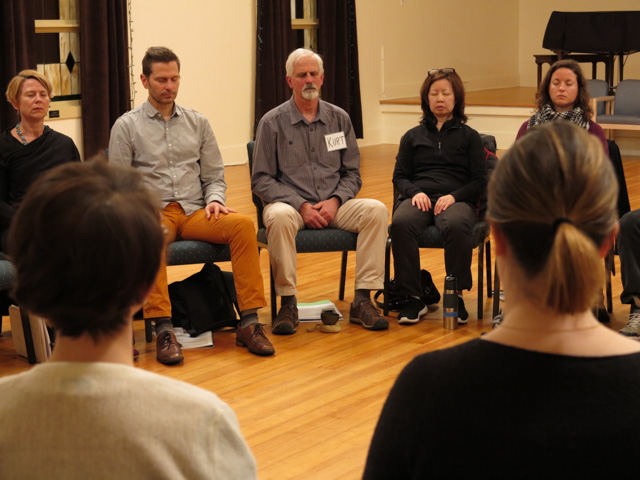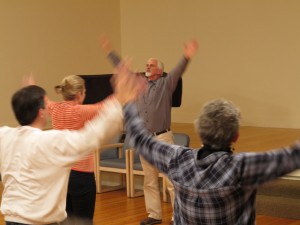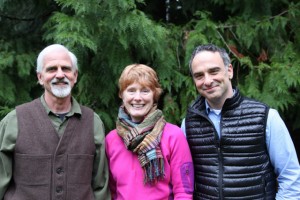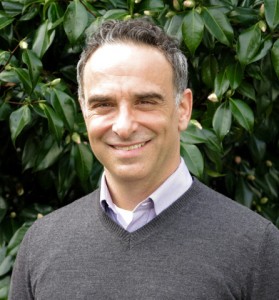Trio of Experienced Mindfulness Teachers
Creating Cascadia Mindfulness Institute
Written by: Jonas Batt

Director Kurt Hoelting leadS sitting meditation during
a community Mindfulness-Based Stress Reduction (MBSR) class at Samaritan Center in Seattle.
Photos by: Jonas Batt, Josh Berkowitz, Mattie Martina Muñoz
This January, Janice Sack-Ory, Kurt Hoelting and I launched Cascadia Mindfulness Institute to offer high-quality mindfulness training to individuals, organizations, and companies around the Pacific Northwest.
Our intent is to bring our passion for the dharma into our local communities. Our mission is help people and organizations reduce stress, foster resiliency and promote well-being of mind, body and spirit through “evidence-based mindfulness education.” This term refers to mindfulness programs based on research proving their effectiveness.
Cascadia Mindfulness Institute, also known as CMI, is proud to have been recently chosen to provide mindfulness and loving-kindness education for the Veterans Affairs Puget Sound Healthcare System. CMI also currently partners with the Samaritan Center of Puget Sound to offer community Mindfulness-Based Stress Reduction (MBSR) classes.

A Qi Gong class, part of the training offered by Cascadia Mindfulness Institute.
MBSR, the cornerstone of our offerings, is an intensive, eight-week class series, which includes an all-day silent retreat. The program supports development of a personal mindfulness practice through basic skills including body scan, breath meditation, walking meditation, gentle yoga and informal awareness practices.
Developed by Jon Kabat-Zinn in 1979, MBSR is now supported by over 30 years of research demonstrating its efficacy for a variety of physical and mental health issues, and has given rise to a range of Mindfulness-Based Interventions (MBIs).
These include Mindfulness-Based Cognitive Therapy (MBCT) for depression and anxiety, and Mindfulness-Based Relapse Prevention (MBRP) for substance misuse. These are just a few of many MBSR adaptations tailored to specific populations.
In addition to Mindfulness-Based Intervention classes, CMI offers training in loving-kindness meditation and iRest, a form of trauma-sensitive mindfulness education, in the community, in health care, and for organizations. We also provide customized on-site in-service trainings, ranging from two hours to two days, to support organizational investment in employee wellbeing and professional development.

Cascadia Mindfulness Institute founders from left: Kurt Hoelting, Janice Sack-Ory, Jonas Batt.
“CMI is our attempt to provide quality access to basic mindfulness…practices in the wider, non-Buddhist world,” said co-founder Kurt Hoelting, a Zen practitioner for over 30 years who is also an ordained minister in the United Church of Christ. “As teachers who are deeply schooled in classical Buddhist practice, we believe that everyone can benefit from these practices, not just those who consider themselves Buddhist.”
The explosion of mindfulness in the popular consciousness has marked a new era of the dharma taught by the Buddha. This “mindful revolution,” featured on the cover of Time Magazine in January of 2014, reflects the movement of the practice into many parts of our culture.
Mindfulness interventions like MBSR are increasingly attractive, not only to primary care systems that are shifting to wellness and prevention, but also to organizations committed to supporting employee health and wellbeing. CMI aims to be part of this significant cultural change.
“The health benefit of applied meditative discipline is… scientifically documented in a way it never could have been before,” Kurt said. “The practice of mindfulness has great potential to enhance well-being for ordinary people.”
Mindfulness helping military veterans
The U.S. Department of Veterans Affairs is one setting where mindfulness-based education shows significant potential to offer solace to those suffering deeply, as a result of their experiences in war.
“Praise Jesus, mindfulness works!” a female veteran exclaimed after a Mindfulness-Based Stress Reduction class at Seattle’s veterans hospital.

Janice Sack-Ory.
Teaching mindfulness and loving-kindness at the hospital for the last five years, I continue to be amazed by the power of the practice. I’m delighted by its profound potential to support healing across widely- varied cultures and attitudes.
We don’t mention the dharma or the Buddha in Veterans Affairs classrooms, though both are inherent in every aspect of what we teach.
My colleague Janice Sack-Ory offers her expertise in trauma-informed mindfulness education to women veterans who have experienced military sexual trauma.
“We have an exciting opportunity to explore the universal aspects of our humanness in a way that makes sense and is relevant to all those we work with, not just those who might come to the dharma of their own accord,” said Janice, a retired nurse-midwife with 30 years of experience in health care.
Mindfulness-based interventions are not separate from the dharma, but simply a different expression of the essential teachings, which can make them accessible across varied cultural contexts and belief systems.
“We all share in the commonality of this human experience… to re-connect, to re-member that which makes us whole. However, this must be done in a culturally competent way,” said Janice, who practices yoga and Vipassana meditation. “To me, this is what mindfulness, as a powerful extension of the dhamma, offers our world.”

Kurt Hoelting.
This new accessibility of the teachings comes at a moment in human history when the world is undergoing new strains such as climate change, a time when they are needed more than ever.
“We live in a time of deep disorientation,” said Kurt, who is also author of “The Circumference of Home. This is the story of his decision, for climate impact reasons, to limit himself to traveling just 100 kilometers from his home in Western Washington state, and not by automobile.
“The pace and scale of change – from social upheaval to political fragmentation to climate disruption – is accelerating faster than the human psyche can adapt,” Kurt said. “Human trauma and suffering are mounting as a result.”
Through mindfulness education, we have the opportunity to face, hold, and attempt to heal this deep suffering.
But at times, we feel the uncomfortably cold winds of capitalism blowing through our efforts as we develop Cascadia Mindfulness Institute. How do we place a “market price” on invaluable teachings that have been offered freely for millennia?

Jonas Batt.
Despite our materialistic culture’s demand for a product, to “get something for the money,” we at Cascadia Mindfulness Institute endeavor to hold the teachings with deep respect and skillful integrity, as we bring them into the wider culture for the benefit of all beings.
As we begin this new journey together, we have the profound opportunity to support greater resiliency, well-being, and awareness not only for ourselves, but also for others.
My colleague Janice underlines our collective aspiration to walk the path of awakening for the benefit of all beings. “This is…right action, right livelihood and right effort,” she said. “This is the dhamma in action.”
